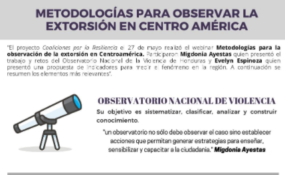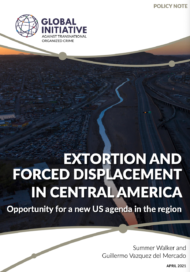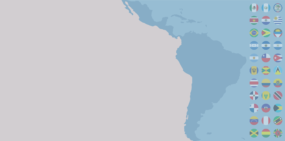Can the innovative measures adopted by an Italian NGO to help businesses and consumers combat mafia extortion be replicated in the Northern Triangle?
‘An entire population who pays pizzo is a population without dignity.’ This is the phrase that in 2004 sparked a social movement against extortion payments – or pizzo, in Italian – demanded by the mafia in Palermo, Italy. AddioPizzo was born as a civil-society organization whose manifesto is to inculcate a collective cultural revolution against the mafia. It is a grassroots organization advocating for a mafia-free economy. While its mission is to encourage opposition to pizzo among businesses and consumers, it also provides legal support and economic alternatives to businesses by promoting ethical consumerism to counter extortion, while educating for change, especially among the younger generations.
The Global Initiative Against Transnational Organized Crime in 2019 launched the Coalitions for Resilience project with the objective of gaining a better understanding of extortion in Central America, curating a conversation that sheds light on the phenomenon and setting out solutions by nurturing community resilience capabilities against this crime, which is rife across the region. This is done by documenting practices and developing local capabilities against extortion to develop resilient responses against this crime.
Although the Italian origins of the AddioPizzo movement may be very distant from countries like Guatemala, El Salvador and Honduras, there are distinct parallels between the way the Sicilian Cosa Nostra and the gangs, or maras, of Central America operate. Extortion, which is effectively a form of taxation, is a means by which the mafia or the maras exert territorial control and at the same time seek to legitimize their power; and in both cases, the cash from extortion is used to pay gang members.
The experience of AddioPizzo in pushing back against the Italian mafia’s stranglehold has shown how communities anywhere in the world, including Central America, can build resilience to organized crime. They offer nine recommendations that are critical for stakeholders, including civil-society organizations from the Northern Triangle countries, in their efforts to take a stance against extortion
1. Break the silence: Extortion is a pervasive crime that involves not only those businesses forced to pay fees to criminals, but also consumers who turn a blind eye to the fact their own money will end up in the hands of the mafia. To disrupt this cycle, AddioPizzo recommends starting an open conversation. The phrase highlighted at the start of this article was printed on hundreds of stickers and distributed in public in Palermo, Sicily.
2. Change the perspective: For a long time, extortion was accepted as a social norm in places where the Cosa Nostra operate. AddioPizzo raised public awareness of the problem by helping to build critical thinking among customers and business owners, such as shopkeepers. The logic is as follows: customers buy goods in certain shops; these shops are required to pay extortion fees; the money customers spend there goes to the mafia. Thus, the ordinary customer is part of the extortion problem, but, with a change of culture, he or she can be part of the solution too.
3. Create a network: In 2006, AddioPizzo established ‘Pago Chi Non Paga’ (meaning, literally, I pay the person who does not pay (i.e. protection money)). This is a network of over a thousand Sicilian businesses registered with the organization. Through this network of businesses that have chosen to resist extortion, AddioPizzo promotes conscientious consumption with a view to encouraging mafia-free shopping. A mobile application enables customers to locate participating businesses that don’t pay extortion.
4. Overcoming victim isolation: Refusing to pay can trigger retaliation from the mafia, and even rejection by the community for upsetting the criminal organization. It is paramount therefore to team up to provide support to those businesses who stand up against the mafia. AddioPizzo has successfully catalyzed community support for businesses facing retaliation from the mafia. Businesses that used to pay extortion can benefit from the shield that the network provides.
5. Declare your membership: AddioPizzo produces stickers with its logo that can be displayed by participants in their businesses. This serves both to attract customers and provides a visible warning to the mafia. According to co-founder Edoardo Zaffuto, arrested members of the mafia confirmed that this membership display was effective. In one particular town, said a mafia member, ‘everybody payed pizzo, except the AddioPizzo shops. We used to skip them completely, it would have been stupid even to try.’
6. Boost trust: The organization realized that the critical consumer movement and mafia-free business network would, in themselves, not be enough to resist the mafia. Therefore, they have built collaboration and trust with the Italian Carabinieri, who are key to the law-enforcement response. AddioPizzo also provides legal support and advice to victims of the mafia.
7. Leverage and economic impact: To increase the economic and social impact of the ethical consumerism campaign, the organization established AddioPizzoTravel and AddioPizzoStore to bring additional customers to the network and create financial sustainability. The first sells mafia-free tourism in Sicily; the second provides a variety of products that can be delivered to the customer’s door – guaranteed to be untainted by mafia involvement in the supply chain.
8. Develop a social approach: Economically depressed areas provide notoriously fertile ground for mafia recruitment. From donations made by businesses participating in the AddioPizzo programme, the organization has begun to develop social inclusion activities for children living in Piazza Magone, including the construction of a playground, and various educational and social activities.
9. Educate for change: It is necessary to educate students about the mafia and extortion. For AddioPizzo, it is the younger generations who will be critical in resisting the influence of the mafia in society.
The holistic approach pioneered by the AddioPizzo initiative to help combat extortion has proven to be a useful tool in generating resilient businesses and communities. Its methods and approach could inspire civil-society organizations in Central America to replicate some of its activities. As Mauricio Bastien, member of the Network of Experts against Extortion, says, ‘It shows the importance of supporting victims of extortion and focusing on the root causes of the crime, as well as fostering community resilience and support against gangs.’
The Coalitions for Resilience project plans to continue the dialogue on the topic and in the following days will present a Training of Trainers Guide and a manual to help build resilient communities against extortion in the region.
Decir NO a la extorsión en Centroamérica: ¿Qué podemos aprender de Italia?
Las medidas innovadoras para ayudar a negocios y consumidores combatir la extorsión de la mafia siciliana, desarrolladas por una organización de la sociedad civil italiana, ¿pueden ser replicadas en los países del Triángulo Norte?
‘Una población que paga pizzo es una población sin dignidad’. Esta es la frase que en 2004 inició un movimiento social contra los pagos de extorsión -o pizzo, en italiano- demandados por la mafia en Palermo, Italia. AddioPizzo surgió como una organización de la sociedad civil que busca impulsar una revolución cultural colectiva en contra del crimen organizado y que promueve una economía libre de mafia. Aun cuando su misión principal es promover la resistencia al pago de pizzo de negocios y sus clientes, también provee apoyo legal y alternativas económicas para negocios comunitarios al procurar el consumo ético para combatir la extorsión y, al mismo tiempo, educar para el cambio, particularmente de las generaciones más jóvenes.
En 2019, la Iniciativa Global en contra el Crimen Organizado Transnacional lanzó el proyecto Colaciones por la Resiliencia con el objetivo de tener un mejor entendimiento de la extorsión en Centroamérica, a través de conversaciones que arrojan luz sobre fenómeno y soluciones que promueven capacidades de resiliencia comunitaria en contra de este crimen, que tanto afecta a la región. Esto se realiza al documentar prácticas y contribuir al desarrollo de capacidades locales contra la extorsión para impulsar la resiliencia comunitaria contra este crimen.
Aun cuando los orígenes italianos del movimiento desarrollado por AddioPizzo podrían parecer muy distantes de países como Guatemala, El Salvador y Honduras, existen paralelismos en la forma de operar de la Cosa Nostra Siciliana y las pandillas o maras de Centroamérica. La extorsión, que es una forma de cobrar impuestos, es una manera en que la mafia o las maras ejercen control territorial al tiempo que buscan una legitimación de su poder, en ambos casos, el dinero obtenido de las extorsiones es utilizado para pagar a sus miembros.
La experiencia de AddioPizzo en contrarrestar el poder de la mafia italiana, muestra como las comunidades alrededor del mundo, incluidas las centroamericanas, pueden desarrollar resiliencia en contra del crimen organizado. La iniciativa ofrece nueve recomendaciones que son muy importantes en los esfuerzos contra este crimen de actores locales y organizaciones de la sociedad civil del Triángulo Norte.
1. Romper el silencio: la extorsión es un crimen que afecta a todos los estratos sociales y económicos. Involucra no solo a los negocios que son forzados a pagar cuotas a los criminales, sino también a los consumidores o clientes quienes son omisos en aceptar que su dinero terminará en las manos de la mafia. Para romper este ciclo, AddioPizzo recomienda iniciar una conversación. La frase ‘Una población que paga pizzo es una población sin dignidad’ se imprimió en cientos de estampas o pegatinas que fueron distribuidas en la ciudad de Palermo, Sicilia y detonó un diálogo comunitario.
2. Cambiar la perspectiva: por un largo tiempo, la extorsión fue normalizada y aceptada como una norma social en los lugares donde operaba la Cosa Nostra. AddioPizzo promovió la conciencia pública sobre el problema y ayudó a construir un pensamiento crítico entre los clientes y dueños de negocios. La lógica es la siguiente: los clientes compran productos en algunas tiendas, estas tiendas son obligadas a pagar extorsión, entonces, el dinero que los clientes gastan llega a las manos de la mafia. Luego entonces, los clientes o consumidores también son parte del problema de extorsión, pero, con un cambio cultural o de perspectiva, el o ella también puede ser parte de la solución.
3. Crear una red: en 2006, con la frase ‘Pago Chi Non Paga’ (que literalmente significa, yo pago a la persona que no paga -extorsión-) AddioPizzo impulsó una red de más de 1,000 negocios sicilianos que eligieron resistir el pago de extorsión. Así se promueve el consumo libre de mafia. Incluso desarrollaron una aplicación móvil que permite a los consumidores localizar con facilidad los negocios que no pagan extorsión.
4. Sobreponerse al aislamiento: reusarse a pagar la extorsión, puede desencadenar represalias de la mafia e incluso, rechazo de la comunidad por molestar a la organización criminal. Por ello, es fundamental hacer equipo con aquellos negocios que se enfrentan a la mafia. Con el liderazgo de AddioPizzo, se ha logrado generar apoyo comunitario a aquellos negocios que enfrentan represalias. Así, los negocios que antes pagaban extorsión, ahora se benefician de la protección que les brinda la red.
5. Declarar la membresía: AddioPizzo produce estampas o pegatinas con su logo que se colocan de manera visible a la entrada de los negocios participantes de la red. Esto sirve para atraer nuevos clientes y alertar a la mafia. De acuerdo con el co-fundador de la organización, Edoardo Zaffuto, miembros de la mafia que han sido arrestados, afirman que hacer pública la membresía del negocio a la red es efectivo. ‘Todos pagaban pizzo, excepto los negocios afiliados a AddioPizzo. Solíamos saltarnos estos negocios ya que hubiera sido estúpido siquiera tratar’ dijo uno de los miembros de la mafia en una ciudad de Sicilia.
6. Aumentar la confianza: la organización de la sociedad civil italiana se percató que incentivar el consumo ético y una red libre de amenazas de la mafia, no sería suficiente. Así, desarrollaron una relación de colaboración y confianza con Los Carabineros (policía italiana) que son clave para brindar una respuesta en conjunto con las instituciones de seguridad. Además, AddioPizzo provee apoyo legal y asesoría a las víctimas de la mafia.
7. Apalancar el impacto económico: para aumentar el impacto económico y social de la campaña de consumo ético, la organización generó AddioPizzoTravel y AddioPizzoStore con el objetivo de atraer clientes adicionales a la red e incrementar la sostenibilidad financiera. La primera ofrece servicios turísticos libres de mafia en Sicilia; el segundo provee una variedad de productos con garantía de ser desarrollados sin intervención de la mafia en la cadena de producción, que pueden ser entregados a las puertas del cliente
8. Desarrollar un enfoque social: las áreas económicamente deprimidas proveen terreno fértil para el reclutamiento de la mafia. Con donaciones realizadas por los negocios de la red desarrollada por AddioPizzo, se han impulsado actividades que buscan incluir a niños que viven en la Piazza Magone, que incluyen la construcción de un área de juegos, así como actividades educativas y sociales.
9. Educar para el cambio: es necesario educar a los estudiantes sobre la extorsión de la mafia. Para AddioPizzo, las generaciones más jóvenes son fundamentales para restringir la influencia de la mafia en la sociedad.
El enfoque holístico del que AddioPizzo es pionero, ayuda en el combate a la extorsión y ha probado ser útil en generar negocios y comunidades resilientes. Su metodología podría inspirar a organizaciones de la Sociedad Civil de Centroamérica para replicar algunas de las acciones mencionadas. Mauricio Bastién, miembro de la Red de Expertos contra la Extorsión destacó que la iniciativa ‘muestra la importancia de brindar apoyo a las víctimas de la extorsión y de enfocarse en las causas del crimen, así como en fomentar apoyo y resiliencia comunitaria en contra de las pandillas.’
El Proyecto ‘Coaliciones por la Resiliencia’ continuará con la apertura de espacios de diálogo sobre el tema de extorsión y en las próximas semanas presentará una iniciativa de ‘capacitación de capacitadores’ que con base en una Guía y Manual de Resiliencia Comunitaria contra la Extorsión, que buscan contribuir a la generación de comunidades resilientes contra este delito en la región.



